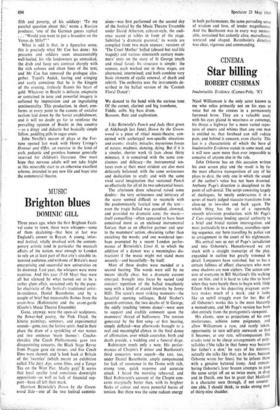Inadmissible Evidence (Cameo-Poly, 'X')
CINEMA
Star billing
ROBERT CUSHMAN
Nicol Williamson is the only actor known to me who relies primarily not on his eyes or voice but on the creases in a permanently furrowed brow. They are a valuable asset; with his eyes glazed in weariness or contempt, his throat a highway for a more varied reper- toire of sneers and whines than any one man is entitled to, that forehead can still radiate pain, and behind it concern, even charity. This last is a characteristic of which the hero of Inadmissible Evidence stands in some need, and it will now seem more than ever impossible to conceive of anyone else in the role.
John Osborne has on this occasion written his own screen play and the result is by far the most effective transposition of any of his plays to date, the only one in which the sound of the author's voice has not been drowned.
Anthony Page's direction is disciplined to the point of self-denial. The script consisting largely of duologues, he neatly underscores it in a series of nicely judged staccato transitions from close-up to two-shot and back again. The whole thing has the air of a supernally smooth television production, with Mr Page's Z Cars experience lending special authbrity to a brief and brutal station interrogation, and most particularly to a wordless, soundless open- ing sequence, our hero travelling by police van to arraignment in the court of his nightmares. His arrival sees us out of Page's jurisdiction and into Osborne's. Henceforward we are stuck with a straight transcript of the play, expanded in outline but greatly trimmed in detail. Longueurs have vanished, but so has a certain fullness of effect; characters who were once shadows are now ciphers. The action con- sists of everyone in Bill Maitland's life walking out on him, and it is hard to take this to heart when they were barely there to begin with. Only Eileen Atkins as his departing pregnant secre- tary makes much of a mark, and it looks like an uphill struggle even for her. But of all Osborne's works. this is the most blatantly a monodrama, and Mr Page's version has been shot entirely from the protagonist's viewpoint.
His clients, seen. as projections of his own misfortunes, achieve some poignancy, and
allow Williamson a rare, and rarely taken, opportunity to turn self-pity outwards so that it becomes, at any rate, self-compassion. His cracks tend to be cheap arrangements of poly- syllables ('She talks in that funny way because her father's a don,' he says of his mistress; actually she talks like that, as he does, because
Osborne wrote her lines), but he infuses them with a genuine battered irony. And remem-
bering Osborne's later brazen attempts to pass the same script off on us twice more, in drag and in Dutch, one has to grant that Maitland is a character seen through, if not around: one able, I should think, to make strong men of thirty-nine shudder.






































 Previous page
Previous page